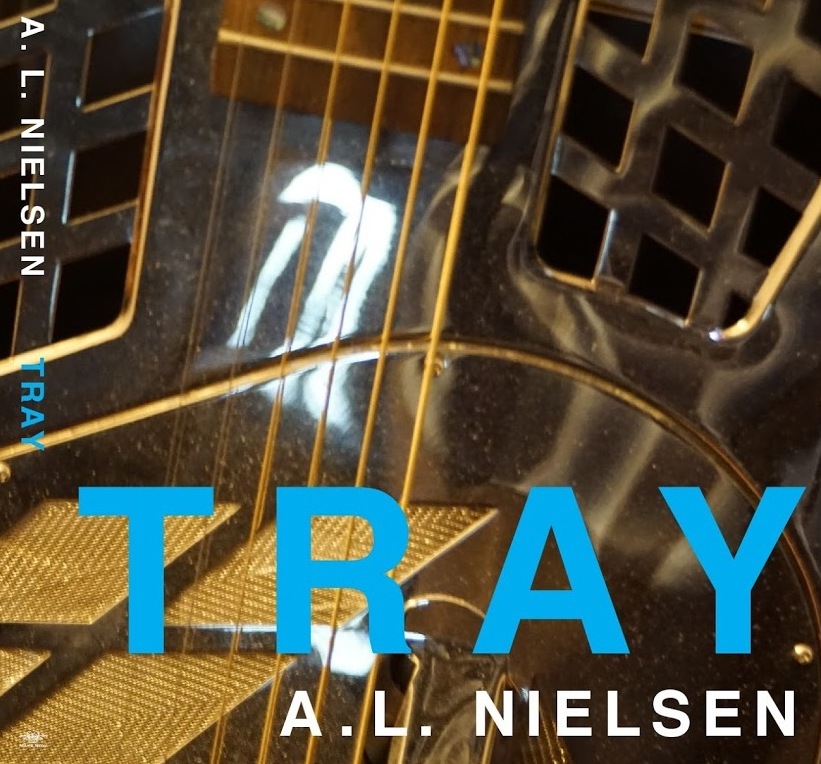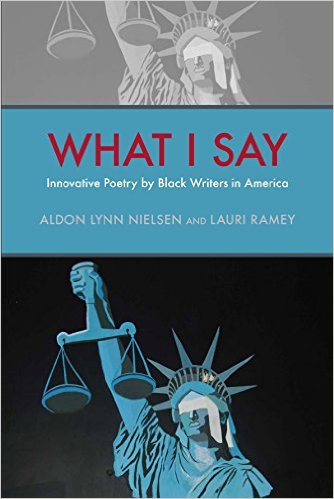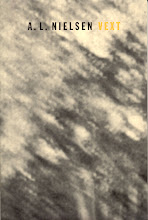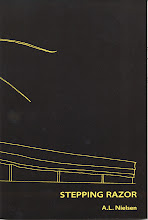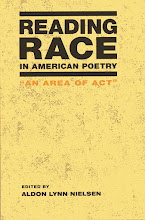When the National Poetry Foundation series of conferences held at Orono, Maine, came to American Poetry of the 1960s, I was asked by the organizers to provide an introduction to Amiri Baraka's poetry reading. This was the second of three times I've introduced Baraka at an event, the second of three times I had the task of introducing someone who used to grade my papers. Below I reproduce the remarks I made in bringing Baraka to the stage at the University of Maine.
"In the 60's, there was emotion to go around barreling explosions, at and against, waves of running, the world itself was feeling, all feeling. I felt that.
Those shadows haunt us now in various ways."
Three decades further on, we meet again. Amiri Baraka titled the poem from which I've drawn these lines "Courageousness. The poem ends,
"There was no reason to be square, that's what
we felt. We could do anything, be anything, even free. That's
how young we were. That's now long ago, that was."
Those too young to recall just how that was may not know the price that was exacted for such exacting measures. The end of the decade witnessed a flurry of memos within the Federal Bureau of Investigation outlining plans to send poison pen letters, forged in the name of the Black Panthers, denouncing Baraka. A similar plan had been put into murderous effect already, leading to violence between members of the Panthers and Maulana Karenga's US organization in Los Angeles. We can still read the glee with which the FBI addressed itself to these operations. One of the memos predicts that "This proposal will cause disruption not only within Jones' group but also in the Black Panther Party, since Jones has an appreciable following in New Jersey who will resent this statement." Few American poets have had to withstand this mode of critical attention. Few American poets have received a postcard, like the one sent to Baraka in 1981 signed by the "Polish Catholic War Veterans of America" : "A vicious treasonable enemy of the U.S.A. like you needs to be put in jail NOT for just 90 days but FOREVER! We will petition the F.B.I, and President Reagan to see to it that you are removed from positions where you can brain wash our youth. You belong in Iran NOT in the U.S.A."
On the other hand, Paul Van Ness, who had been one of Baraka's teachers at Central Avenue School, recalled the young Leroy Jones years later in a letter to William Kunstler: "He was a good student, a quiet, philosophical boy, and we had long discussions."
And there was a moment, in the sixties, when America's media establishment hoped to enlist Amiri Baraka in their swelling ranks. Following the remarkable success of the Obie-winning play Dutchman,, even the New York Times came calling. Baraka recollects in his Autobiography: "It was as if the door to the American Dream had just swung open, and despite accounts that I was wild and crazy, I could look directly inside and there were money bags stacked up high as the eye could fly." But Baraka closed that door. When the same play was performed in Harlem the white press read the text differently, took it personally, and the phone started ringing in J. Edgar Hoover's offices.
But the work never stopped coming. Some readers, looking at the title of Baraka's Preface to a Twenty Volume Suicide Note through the lenses of a retro-Beat ethos, seem to have overlooked the words "Preface" and "Twenty Volume." I took a census of my bookshelves before coming
here and noted that the volumes have now exceeded forty in number, and that's not even counting all the play productions, recordings, opera and broadsheets. The books of poetry include The Dead Lecturer, Black Magic, In our Terribleness. Spirit Reach, Reggae or Not, Transbluesency. Funk Lore and Hard Facts. The prose volumes, which one of his publishers oddly lists all under the rubric of fiction, include Home. Blues People, Black Music, Daggers and Javelins, Raise and The Autobiography. The newly published Fiction of LeRoi Jones / Amiri Baraka includes Tales. The System of Dante's Hell and his second novel, 6 persons, which until now could only be read in manuscript form among his papers. Then there are the genre-defying works such as Eulogies and The Music. The Music includes important work by both Amiri and Amina Baraka, and any accounting of Amiri Baraka's works would have to include such significant collaborations with Amina Baraka as the anthology Confirmation, their 1982 collection of writings by African American Women. The plays extend from 1964's The Baptism and Dutchman, through A Black Mass, The Toilet, Madheart, Slave Ship. What Was the Relationship of the Lone Ranger to the Means of Production and S-l.
Amiri Baraka has been, as he has remarked, one who is loud on the changing of his ways, but some things have remained constant. The search for a populist modernism that he announced in his introduction to the anthology The Moderns back in the sixties can be found at the heart of all his endeavors. In an early essay looking back to his work on the magazine Yugen. Baraka said: "I found myself publishing that writing which I thought was the most valuable. Not the writing that reflected those tired white lives again, but necessarily those people, those white and black people who were talking about a side of America that was more valuable because it hadn't been talked about." This is the same impulse he addresses in his later poem "The Rare Birds":
Williams writes to us of the smallness of this American century, that it splinters into worlds it cannot live in. And having given birth to the mystery splits unfolds like gold shattered in daylight's beautiful hurricane"
And the one thing that is most easily traced through all of the works of Amiri Baraka is an absolute adherence to "The Aesthetic" as he describes it in a poem of that name included in The Music:
"If you can understand the complexity, of an African mask, the tense ambiguities of Black Blues
then my work should be clear to you, what I say easily understood."
To which I always want to append a line from Williams: "But you've got to try hard." Note that "The Aesthetic" begins in a conditional tense and in the second person. America has not always responded well to complexities and ambiguities, particularly to its own complexities and ambiguities, but there are always those among us willing to enter into a sentence beginning with the word "if," willing to inhabit "you," willing to attend to the myriad subtleties mouthed by the
Blues. There are always those ready to believe they can be anything, even free. Now that's tense ambiguity.

































.jpg)
